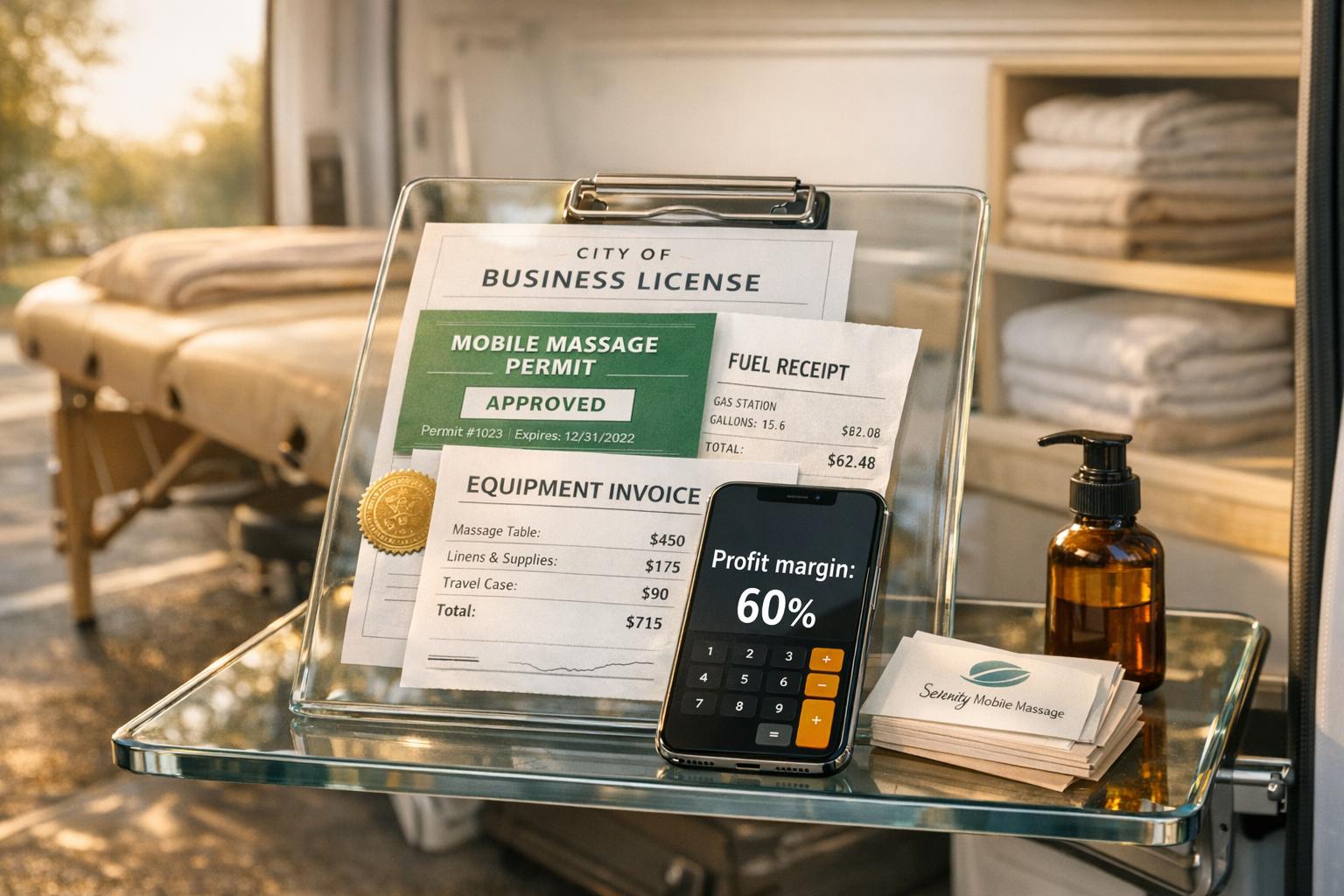
In today's digital world, students can easily start a business with just a laptop and internet access. Forget traditional part-time jobs - laptop-based ventures offer flexible schedules, low startup costs, and room to grow. From selling digital products to freelancing, tutoring, or even running an e-commerce store, there are countless ways to earn while balancing schoolwork. Here’s a quick breakdown of the top opportunities:
- Digital Products: Create and sell e-books, templates, online courses, or stock photography.
- Freelancing: Offer writing, graphic design, social media management, or virtual assistant services.
- Online Education: Tutor, develop courses, or provide academic writing support.
- Content Creation: Start a blog, YouTube channel, or social media platform.
- E-Commerce: Run a dropshipping store, sell print-on-demand products, or resell thrift finds.
- Tech & Coding: Develop apps, plugins, or custom software for businesses.
With affordable tools, student discounts on laptops, and platforms like Teachable, Fiverr, and Shopify, starting a business has never been simpler. Whether you're passionate about design, education, or tech, there’s an idea here for you. Start small, stay focused, and turn your laptop into a source of income.
7 Boring But Realistic Ways To Earn Money With A Laptop With No Skills Or Products
1. Digital Products
Selling digital products is a fantastic way for students to build a scalable business. Unlike physical items, digital products are created once and sold repeatedly, with no need to worry about inventory or shipping. Essentially, your laptop becomes your creative studio and storefront. Here are some digital product ideas you can create and sell right from your computer.
E-books and Guides are a great entry point for student entrepreneurs. You can write about topics you're already familiar with, such as study guides for organic chemistry, dorm-friendly cooking tips, or advice on landing internships. There's always an audience willing to pay for well-organized, practical information. Platforms like Amazon Kindle Direct Publishing let you reach a global audience, while Gumroad and Etsy are excellent for connecting with niche markets.
Online Courses and Tutorials cater to the growing appetite for skill-based learning. Whether it's social media marketing, language acquisition, or effective study techniques, you can share your expertise with others. Creating video courses is simple with tools like OBS Studio for screen recording or basic presentation software. Platforms like Teachable, Udemy, and Skillshare handle everything from payment processing to managing your students, making it easy to focus on content creation.
Digital Templates and Planners are perfect for students who value organization. Think study planners, budget trackers, resume templates, or even social media content calendars. If you have a knack for design, this could be a great option. With tools like Canva Pro - which many students can access for free - you can create professional-looking templates without needing advanced design skills.
Stock Photography and Graphics allow you to turn creative hobbies into income. If you're into photography or graphic design, you can sell your work on platforms like Shutterstock, Adobe Stock, or Creative Market. Campus life and events provide unique opportunities for eye-catching photos. Even images taken with a smartphone can sell well if they tap into trending or underserved niches.
Mobile Apps and Software Tools offer a high-reward opportunity for tech-savvy students. Simple productivity apps, study aids, or campus-specific tools can bring in substantial revenue. You don't need a computer science degree to get started - platforms like Bubble and Adalo let you build functional apps without writing a single line of code. Many successful apps have come from students solving problems they faced in their own academic experiences.
These digital product ideas require minimal upfront costs and can easily fit into a student’s busy schedule.
2. Freelance Services
Freelancing is a great way for students to earn flexible income while gaining practical experience, all without disrupting their class schedules. The trick is to match your skills with market needs and use the right platforms to connect with clients.
Writing and Content Creation is one of the easiest ways for students to dive into freelancing. Whether it's writing blog posts, crafting social media captions, or drafting product descriptions, students with a background in English, journalism, or marketing have a natural edge. But honestly, anyone with solid writing skills can succeed here. Platforms like Upwork and Fiverr help you showcase your samples and link up with clients looking for content creators.
Graphic Design and Visual Content is perfect for students with a creative streak. Designing logos, business cards, Instagram graphics, or even presentation slides can be highly rewarding. Tools like Canva Pro are beginner-friendly and allow you to produce polished designs while you build your expertise and take on more advanced projects.
Social Media Management taps into students’ familiarity with platforms like Instagram, TikTok, and LinkedIn. Small businesses often struggle to maintain an active online presence, and that’s where you come in. You can create content calendars, write posts, engage with followers, and even analyze performance metrics. Your everyday knowledge of these platforms becomes a real asset for businesses.
Virtual Assistant Services cover a variety of administrative tasks such as managing emails, scheduling appointments, conducting research, and data entry. These roles don’t require advanced technical skills, just a knack for organization and attention to detail. Free tools like Google Workspace and Notion can help you stay on top of tasks while gaining valuable experience.
Tutoring and Academic Support is a great option if you excel in certain subjects. Online platforms make it easy to offer tutoring sessions in areas like math, science, foreign languages, or even test prep. As a student, you can relate to the challenges of learning, which makes your teaching style more approachable. With video conferencing tools, you can tutor from anywhere - your dorm, the library, or even a coffee shop.
To succeed in freelancing, focus on building a solid portfolio and maintaining strong relationships with clients. A simple website or a detailed profile on platforms like Upwork, Fiverr, and PeoplePerHour can showcase your work and attract quality clients. LinkedIn is another excellent way to connect with businesses actively looking for freelance help.
These freelance opportunities highlight how students can turn their skills into meaningful services, opening doors to other flexible ventures like online education.
3. Online Education
Building on the idea of flexible freelance opportunities, online education offers an exciting avenue to share your expertise while earning income. With the rise of digital learning platforms, there’s never been a better time to use your knowledge to help others succeed. By teaching and creating educational content, you can inspire others while deepening your own understanding of the topics you’re passionate about.
Online Course Creation gives you the chance to turn your knowledge into structured learning experiences. Whether you’re skilled in a challenging subject, fluent in multiple languages, or adept at coding, platforms like Teachable and Thinkific make it easy to design and sell courses. Start with simple video lessons and refine your content as you gain experience. Many students find modern, relatable teaching styles particularly effective, so don’t hesitate to bring your own personality into the mix.
Live Tutoring Sessions allow you to connect directly with learners through scheduled, structured lessons. Unlike on-demand tutoring, these sessions are planned in advance, giving you time to prepare and tailor your approach. Platforms like Wyzant and Tutor.com can help you reach students seeking help in various subjects. You can set your rates based on the complexity of the material and your level of expertise.
Educational Content Development is another way to contribute to learning. This could involve creating study guides, practice tests, flashcards, or even educational videos. By leveraging your unique perspective, you can design materials that make complex topics easier to grasp, benefiting both students and educators.
Language Exchange Programs are ideal if you’re fluent in another language. Platforms like italki and Preply connect you with people eager to improve their language skills. These sessions often go beyond grammar and vocabulary, offering cultural insights and real-world conversation practice.
Academic Writing Support is perfect for helping others polish their writing and research skills. This goes beyond basic tutoring - you can guide students in structuring essays, conducting research, formatting citations, and mastering academic writing techniques.
The key to success in online education is starting with subjects you genuinely enjoy. Build your reputation by delivering high-quality content and earning positive reviews. Many student educators begin by helping classmates and then expand their reach through online platforms.
sbb-itb-08dd11e
4. Content Creation
Content creation offers a versatile and exciting path for student entrepreneurs, especially when paired with freelance work or educational pursuits. With just your laptop and a dash of creativity, you can dive into a variety of opportunities.
Social Media Video Creator
Produce captivating videos for platforms like TikTok, Instagram, and YouTube. All you need is your smartphone for filming and your laptop for editing, uploading, and managing audience interactions.
Creative Content Producer
Craft standout content such as video presentations, interactive tutorials, or multimedia educational materials. Use compelling visual storytelling and innovative formats to make your work shine.
Vlogger and Blogger
Share your experiences, expertise, or product reviews through video blogs or written posts. From brainstorming ideas to publishing, your laptop becomes your central hub for content creation.
Gaming Content Creator and Streamer
Turn your gaming sessions into engaging content by recording, editing, or live streaming gameplay. Build a community of followers who share your passion for gaming.
Visual Content Creator for Personal Branding
Design eye-catching photo edits, social media graphics, and other visual assets to enhance your personal brand. Professional design tools on your laptop can help you create polished, impactful content.
5. E-Commerce
E-commerce offers students a chance to dive into business ventures with minimal upfront costs. Your laptop becomes your all-in-one tool - serving as your store, inventory manager, and customer service desk. Whether you're selling physical products or digital goods, e-commerce provides a flexible way to earn income while balancing school responsibilities.
Dropshipping Store Owner
Start an online store without the need to stock products. By partnering with suppliers who handle order fulfillment and shipping, you can focus on selecting trending products, marketing your store, and providing great customer service.
Print-on-Demand Designer
Turn your creativity into profit by designing items like t-shirts, mugs, or phone cases. Platforms take care of printing and shipping when a customer places an order, so you can earn royalties without worrying about inventory or logistics.
Digital Product Marketplace Seller
Offer templates, planners, or digital art for download. Using established marketplaces can help you reach a larger audience, as these platforms often attract customers already searching for digital solutions.
Subscription Box Curator
Build a recurring revenue stream by curating themed subscription boxes. Whether it’s study supplies, healthy snacks, or hobby kits, you can create a unique monthly experience tailored to a specific interest.
Vintage and Thrift Reseller
Hunt for hidden gems at thrift stores, estate sales, or clearance racks and resell them at a profit. With well-researched pricing, quality photos, and a focus on specific niches like vintage clothing or collectibles, you can build a loyal customer base and a reputation for great finds.
6. Tech and Coding
If you're already dabbling in coding or just starting out, the tech world is brimming with opportunities to turn your skills into a steady income. All you need is a laptop, an internet connection, and a bit of creativity. From small side gigs to full-fledged businesses, here are some tech-driven ideas that can help you make the most of your coding expertise.
Custom Software Developer
Small businesses and startups often need tailored software solutions. You could start with straightforward projects like creating inventory systems or customer databases. Over time, as your skills grow, you might move on to more complex applications, building a portfolio that showcases your capabilities.
Mobile App Developer
Got a knack for solving problems? Use your experiences as a student to design mobile apps for iOS or Android. Think study planners, campus navigation tools, or even social platforms to enhance student life. With app stores making it easy to distribute your creations, you can earn through downloads, subscriptions, or in-app purchases.
WordPress Plugin Creator
WordPress powers a huge chunk of the internet, which means there's always demand for plugins that solve specific problems. By developing plugins that add useful functionality, you can either sell them on popular marketplaces or offer businesses custom solutions tailored to their needs.
API Integration Specialist
Many businesses struggle to make their software tools work together seamlessly. That’s where you come in - helping them connect platforms like CRMs, payment processors, or marketing tools through API integrations. This specialized service can command high fees, especially from companies looking to streamline their operations.
Tech Consultant for Small Businesses
Local businesses often need help navigating the digital world. Whether it’s choosing the right software, setting up online systems, or simplifying their workflows, your tech expertise can make a big difference. By offering practical and easy-to-understand advice, you can become a go-to resource for businesses looking to modernize.
Conclusion
Starting a laptop-based business as a student has never been easier. With a dependable internet connection and a strong sense of determination, you can dive into opportunities that were almost unthinkable just a decade ago. The 30 business ideas we've discussed cover everything from digital products and freelance services to tech development and content creation. These ventures not only fit around a busy class schedule but also offer the chance to grow as your skills and experience expand.
What makes these ventures so appealing is their low startup cost. Unlike traditional businesses that demand hefty investments, physical locations, or large inventories, laptop-based businesses let you start small and build momentum over time. Whether you’re crafting online courses, designing mobile apps, or offering virtual assistance, you can test your ideas right away and adapt them based on actual feedback from the market. The next step? Mapping out a plan to turn your vision into reality.
Of course, success doesn’t happen by chance - it requires thoughtful planning and validation. Tools like IdeaFloat are invaluable for student entrepreneurs, helping you assess whether your idea solves a real problem, identify customer needs, and analyze competitors to uncover market gaps. These insights help you shape a business that stands out. On top of that, IdeaFloat guides you through essential financial steps, like cost analysis and pricing strategy, ensuring your business is not only meaningful but also profitable.
Balancing your academic life with entrepreneurial goals takes discipline. Research shows that students spend nearly 40 minutes out of every 100-minute class period on nonacademic internet use - like scrolling social media or watching videos - which negatively impacts exam performance. To stay on track, set boundaries during lectures and study sessions, limiting distractions and focusing on your priorities. Collaborating with peers can also be a game-changer, strengthening both your academic understanding and your business network. These habits not only safeguard your grades but also lay a strong foundation for your business.
The digital world has opened doors for students like never before. From your dorm room or a local coffee shop, you have access to global markets, advanced tools, and communities of creators who share your ambitions. The real question is: which opportunity best suits your skills, passions, and long-term goals?
Start small, validate your ideas early, and remember - every successful entrepreneur began with a single step. Your laptop isn’t just a device; it’s your gateway to independence and possibility.
FAQs
How can students effectively balance academics with running a laptop-based business?
Balancing academics while running a laptop-based business requires effective time management and a clear sense of priorities. Start by crafting a schedule that integrates your business responsibilities with your academic workload. Tools like digital calendars or task management apps can help you stay on track and avoid overlooking important tasks.
Consider business ideas that allow for flexible working hours, such as freelancing, online tutoring, or creating digital content. These options let you adjust your work around class schedules and exam periods. Begin with manageable goals and expand gradually to avoid burnout. Even dedicating just a few focused hours weekly can lead to meaningful progress.
Finally, don't shy away from seeking advice or support. Professors, classmates, or mentors can offer valuable insights and guidance to help you tackle obstacles. With careful planning and the right approach, managing both academics and a business is entirely within reach.
What are the best ways for students to test their business ideas before committing too much time or money?
Students looking to test their business ideas should start with a well-defined outline of their goals and assumptions. Begin by diving into market research - determine the size of your target market, pinpoint potential customers, and use tools like search volume data to gauge demand.
Customer feedback plays a key role in shaping your idea. Conduct interviews or surveys to learn what your audience truly needs and values. To take it a step further, try launching a small-scale version of your product or service. This allows you to gather practical insights and adjust your approach based on real-world data. By starting small and learning as you go, you can refine your idea while reducing potential risks.
What should students keep in mind when choosing a laptop-based business idea?
When deciding on a laptop-based business idea, there are a few important factors to keep in mind. First, flexibility is key. Choose something that fits around your school schedule, so you can manage your studies and work without feeling overwhelmed.
Next, think about startup costs. Many students operate on a tight budget, so finding an idea that doesn’t require a lot of upfront investment is a smart move.
You’ll also want to consider scalability. Pick a business that can grow as you gain more experience and free up more time. Lastly, focus on your skills and interests. Building a business around something you’re already good at or truly enjoy can make the work feel less like a chore and boost your chances of success.
Related Blog Posts
Get the newest tips and tricks of starting your business!


